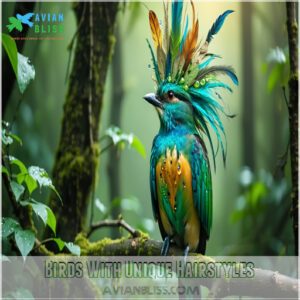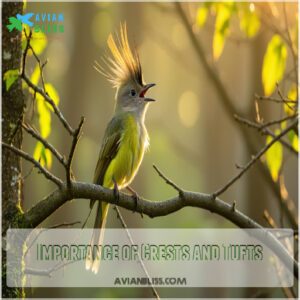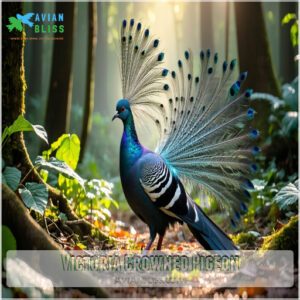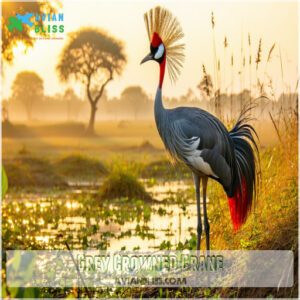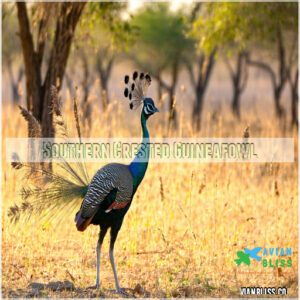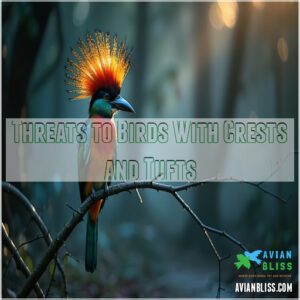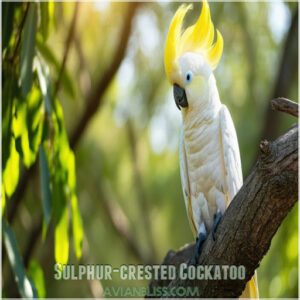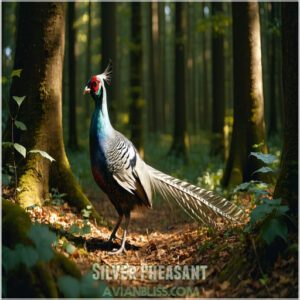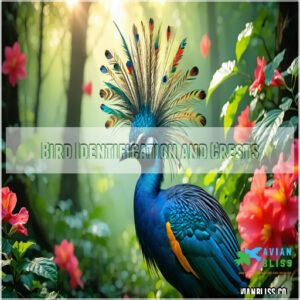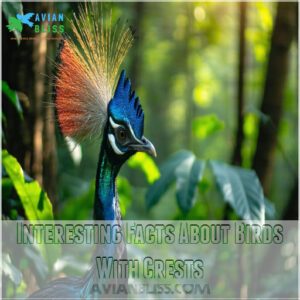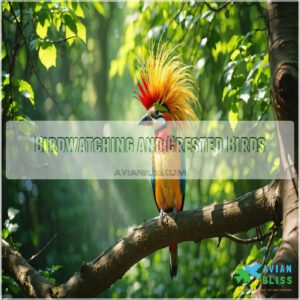This site is supported by our readers. We may earn a commission, at no cost to you, if you purchase through links.

Its wild yellow mohawk isn’t just for show—this iconic crest can signal excitement, mood changes, or even a warning to back off.
Or check out the Victoria Crowned Pigeon, rocking an extravagant blue feather fan with delicate white accents, like nature’s version of royal headwear.
Then there’s the Grey Crowned Crane, strutting across African savannas with a literal golden crown that turns heads.
These hairstyles aren’t just about fashion—they’re key tools for communication, courtship, and survival.
Interested in this fabulous feathered crew? Keep reading!
Table Of Contents
- Key Takeaways
- Birds With Unique Hairstyles
- Importance of Crests and Tufts
- Birds With Crests and Tufts
- Threats to Birds With Crests and Tufts
- Birds With Striking Features
- Unique Features in Different Bird Species
- Bird Identification and Crests
- Conservation Status of Birds With Crests
- Interesting Facts About Birds With Crests
- Birdwatching and Crested Birds
- Frequently Asked Questions (FAQs)
- Do birds have hairdos?
- Why do birds have crazy hair?
- What bird has shaggy hair?
- What birds have tufts of hair?
- Why do birds have hair sticking up?
- What pigeons have funky hair?
- What is the name of the bird with crazy hair?
- What bird has the funny haircut?
- What is a GREY bird with crazy hair?
- What is a black bird with a tuft of feathers on its head?
- Conclusion
Key Takeaways
- You’ll find birds like the Sulphur-crested Cockatoo and Grey Crowned Crane using their wild crests for communication, courtship, and signaling moods.
- Birds’ funky feather styles, like mohawks and tufts, aren’t just looks—they’re practical tools for attracting mates, intimidating rivals, or blending into habitats.
- Habitat loss, illegal hunting, and the pet trade threaten these stylish birds, making conservation efforts crucial for their survival.
- Seeing birds with crazy hair, like the Victoria Crowned Pigeon or Tufted Puffin, is easier when you know their behaviors, habitats, and where to look.
Birds With Unique Hairstyles
You’ll be amazed to discover birds sporting natural hairstyles that put your best hair day to shame, from the sulphur-crested cockatoo’s spiky mohawk to the Victoria crowned pigeon’s elegant feather crown.
Whether they’re using their crests for courtship displays or showing off their unique personalities, these feathered fashionistas prove that nature’s got its own hair salon going on.
Crests and Tufts as Communication Tools
Think of bird crests as nature’s mood rings – these feather signals tell quite a story.
You’ll spot these head plumage displays in action, from flirting to throwing shade at rivals.
When it comes to visual cues, these birds are masters at plume language.
Their crests work overtime as communication tools, helping with everything from mate attraction to showing who’s boss in the flock.
- Watch a peacock’s crest puff up when he’s trying to impress – talk about wearing your heart on your head!
- Notice how birds flash their crests as warning signals, like tiny feathered traffic lights
- Catch subtle crest movements that quietly broadcast social status
Understanding bird behavior communication methods is key to deciphering these complex interactions.
Birds With Spiky Hairstyles
Bird mohawks and feathered crowns aren’t just for looks—they’re nature’s way of spicing things up.
Take a gander at these spiky-haired birds that’ll make you do a double take.
The Victoria Crowned Pigeon is a show-off with its electric-blue fan of spikes, a real head-turner.
If you’re feeling regal, the Grey Crowned Crane rocks a golden straw-like crown fit for any monarch.
And let’s not forget the Tufted Puffin, with its vibrant yellow head plumes that scream, "Look at me!"
These birds know how to work those spiky plumes, using them for everything from courtship dances to mood rings in the sky.
So, if you’re ever feeling a bit bland, take a cue from these crazy-haired birds and embrace your unique style.
After all, life’s too short for boring hairdays!
| Bird Name | Spiky Feature |
|---|---|
| Victoria Crowned Pigeon | Electric-blue fan crest |
| Grey Crowned Crane | Golden straw-like crown |
| Tufted Puffin | Yellow head plumes |
Birds With Curly Hairstyles
Some birds rock curly ‘dos that put salon perms to shame.
Check out these crazy bird hairstyles:
- The Eurasian Hoopoe sports an orange-tipped crest, a retro pompadour with serious swag.
- The Sulphur-crested Cockatoo rocks a bouncy yellow mohawk—a stylist’s dream.
- The Great Curassow’s natural curls are enviable, and its fuzzy plumage is a sight to behold.
From feather texture to avian crests, these birds with crazy hair will make your jaw drop.
Birds With Other Hairstyles
Some birds rock hairdos that’ll make you wonder if they’ve just walked out of a salon.
Take the Smew, for instance, with its sleek white crest, or the Golden Pheasant, showing off a vibrant orange-yellow crown.
These birds are the epitome of avian fashion:
- The Smew’s pristine white crest resembles a perfectly styled pompadour.
- Golden Pheasants’ vibrant orange-yellow crowns are a sight to behold.
- Royal Flycatchers’ colorful fan-like crests are nature’s way of saying, "Look at me!"
- Victoria Crowned Pigeons’ elegant, lace-like headpieces finish off their sophisticated look.
These birds prove that in the matter of hairstyles, the sky’s the limit!
Importance of Crests and Tufts
From wild styles to practical purposes, those crazy hair bird crests and tufts aren’t just for aesthetics, they’re essential tools for communication and survival.
Imagine a bird flashing its crest to attract a mate – that’s bird signaling in action.
These head plumes, whether a spiky mohawk or a fluffy pompadour, play a significant role in feather evolution and crest variations.
Understanding the importance of habitat is also vital for the well-being of birds with such distinctive features.
| Crest Functions | Examples |
|---|---|
| Mating Displays | Peacocks fanning their tail feathers |
| Defense Mechanisms | Puffing up to appear larger |
| Species Recognition | Distinctive crest shapes |
| Social Hierarchy | Dominant birds displaying larger crests |
Observe how a Great Crested Flycatcher uses its prominent crest – a peaked, crazy hair bird look – for both attracting mates and intimidating rivals.
This head plumage isn’t just a fashion statement; it’s a vital part of how birds interact with their world.
Different crest functions have evolved over time, contributing to the incredible diversity of bird hairdos we see today.
Birds With Crests and Tufts
Birds with crests and tufts sport some seriously wild hairstyles, and they’re not just for show.
These funky feather arrangements serve important purposes, from communication to courtship.
Get ready to meet some feathered friends with seriously crazy ‘dos.
Victoria Crowned Pigeon
Get ready to meet the Victoria Crowned Pigeon, a bird that knows how to rock a ‘do! This New Guinea native sports a massive blue crest with white tips, making it the ultimate feathered fashionista.
But it’s not just about looks—this ground-dwelling beauty uses its crest to communicate and attract mates with elaborate dances.
Sadly, these stunning birds are facing habitat loss. So, if you’re lucky enough to spot one, enjoy the show and those vibrant feather colors!
Learning about their conservation status is essential for understanding the threats they face.
Grey Crowned Crane
The Grey Crowned Crane is a supermodel in the bird world, strutting its stuff in African grasslands and wetlands with a head-turning, golden crest.
These elegant birds stand out with their grey feathers and unique hairdos.
- They’re known for their elaborate courtship dances and unique calls that resemble honking trumpets.
- These cranes are monogamous, pairing up for life, and their diet includes grass and small critters.
- Conservation efforts are essential as their habitats shrink, and they use their crests to communicate and assert dominance.
- You might spot them in wetlands or grasslands, and their calls will surely grab your attention.
- These feathered fashionistas know how to work it!
Tufted Puffin
Now, who’s the real clown? It might be the Tufted Puffin, with its comical ‘bad hair day’ look.
These seabirds sport two golden plumes behind their eyes, a unique bird species indeed! During breeding season, their beaks turn vibrant orange-red.
Tufted Puffins are skilled divers, fishing deep for their meals, and nesting in burrows on coastal cliffs.
Sadly, climate change and overfishing threaten their populations, making seabird conservation efforts essential for their survival and crazy hairdos.
Southern Crested Guineafowl
While tufts on puffins are a treat for the eyes, the Southern Crested Guineafowl takes it up a notch with a curly crest that’s straight out of a punk rock album cover.
These birds are speckled fashionistas strutting their stuff in sub-Saharan Africa, enjoying a ‘Least Concern‘ conservation status. They’re foodies, indulging in seeds and small critters. But the real showstopper is their breeding season, where they lay up to 20 eggs in grassy nests. Now that’s what you call a feathered family!
The Southern Crested Guineafowl is more than just a funky hairdo:
- Their curly crest serves a purpose, whether it’s for attracting mates, expressing emotions, or communicating with peers.
- These birds know how to keep their feathers in top shape, preening and caring for them daily.
- They’re social birds, and their crazy hairdos might play a role in their complex social dynamics and mating rituals.
Philippine Eagle
The Philippine Eagle takes the cake for wild hairdos.
This critically endangered bird sports a messy brown crest, blending seamlessly with its forest habitat.
Sadly, habitat loss and hunting put these majestic birds at risk.
With only 400 left in the wild, Philippine Eagle conservation efforts are essential for their survival.
This crazy-haired raptor is a true punk rocker of the skies, standing out among exotic bird breeds.
Threats to Birds With Crests and Tufts
Unfortunately, birds with crazy hairdos face unique threats.
You’ll learn about the challenges these birds encounter due to habitat loss, illegal hunting, and the pet trade, and why these threats are a serious cause for concern, specifically because of the impact on birds with crazy hairdos.
Habitat Loss
Those vibrant, spiky, and colorful ‘dos are facing a major threat: habitat loss.
Human activities are giving our feathered friends a serious bad hair day.
From deforestation to climate change, their once-cozy homes are disappearing faster than you can say "bird’s nest hairdo."
It’s like Mother Nature’s giving these birds an unwanted makeover, and it’s not pretty!
Understanding birds with hair is essential to addressing the conservation issues they face.
Let’s help our bird friends keep their crazy ‘dos!
After all, who doesn’t love a bit of feathered flair?
Here are the top three ways human activities are messing with their manes:
- Urban sprawl: As cities expand, natural habitats get paved over.
- Agricultural expansion: Clearing land for farming destroys nesting grounds.
- Pollution: Contaminants alter food sources and breeding habits.
Illegal Hunting
Poachers crashing your bird-watching party is a serious bummer.
Illegal hunting is a threat to our feathered friends with funky hairdos, and it’s no joke.
These birds are targeted for their unique crests and tufts, leaving populations in a tough spot.
It’s like someone stealing your favorite hairstyle and leaving you with a bad hair day forever.
Conservation efforts are essential in protecting birds with crazy hair styles, and stricter hunting regulations can help.
Take a look at how this plays out in the wild:
| Species | Poaching Impact |
|---|---|
| Philippine Eagle | Critically endangered |
| Sulphur-crested Cockatoo | Population decline |
| Grey Crowned Crane | Endangered status |
Conservation efforts are key to fighting wildlife crime, and a more aware public can help keep these amazing birds safe and sound.
Remember, their wild hairstyles are meant to be admired from a distance, in their natural habitats, and conservation is crucial for their survival.
Their unique crests and tufts make them a target, but with awareness and action, we can protect them.
Collection for Pet Trade
The pet trade, fueled by exotic bird enthusiasts, poses a significant threat to these feathered fashionistas.
Their wild hairstyles make them a target, leading to an unethical market with dire consequences: dwindling populations and ecosystem imbalances.
Conservation efforts are fighting back with stricter trade regulations and laws to curb illegal activities.
Here are some ways you can help:
- Adopt, Don’t Shop: Consider adopting a rescue bird. You’ll get a quirky companion, and these birds need good homes.
- Support Sanctuaries: Help sanctuaries dedicated to caring for these stylish avians.
- Ethical Ownership: If you already own an exotic bird breed, prioritize responsible ownership and education.
- Spread Awareness: Raise awareness about the ethical implications of the pet trade and the vulnerability of specific bird breeds.
Let’s keep those crazy-haired birds free and flying!
Birds With Striking Features
Get ready to be amazed by some truly wild and crazy hairstyles in the bird world.
From bright and colorful crests to mohawk-style feathers, these birds will make you rethink the term "bird hair.
Sulphur-crested Cockatoo
Get ready to meet the feathered version of Einstein—the Sulphur-crested Cockatoo.
This bird sports a massive yellow mohawk that’s sure to make you look twice.
Beyond its wild hairstyle, this bird’s got brains.
They’re known problem-solvers, cracking puzzles with ease.
Their diet includes seeds, fruits, and the occasional insect.
They are social butterflies, they love to chatter with their flock.
Conservation efforts are key to keeping these clever birds thriving.
| Bird Species | Hairstyle | Crest Functions |
|---|---|---|
| Sulphur-crested Cockatoo | Massive Yellow Mohawk | Communication, Mate Attraction, Emotional Expression |
| Desert Cardinal Bird | Unique, but Less Flashy | – |
| Cockatoo Behavior | Social, Chatty | – |
| Beak Health | – | – |
Silver Pheasant
Silver Pheasants are nature’s very own superheroes, sporting sleek silver feathers and a striking red mask. These fashionable fowls are a sight to behold and are found in the dense forests of Southeast Asia. Here’s a lowdown on these unique birds:
- Silver Pheasants are masters of disguise, blending seamlessly with their forest habitat. Their silver feathers provide the perfect camouflage, making them almost invisible to predators.
- Their diet is quite the spread, ranging from seeds to insects and even small animals. It’s like having a buffet in the wild!
- These birds know how to keep things cozy, nesting on the ground and laying up to 12 eggs. That’s one feathered family!
- Sadly, these stylish birds are near-threatened due to habitat loss. Let’s hope they can continue to strut their stuff in the wild.
Polish Crested Chicken
Who knew chickens could rock crazy hairdos?
Polish crested chickens are the ultimate feathered fashionistas, sporting a look that’s both unique and natural.
These birds have been turning heads since the 16th century.
With their friendly personalities and quirky flair, they’re popular show birds.
But it’s not all about looks—these chickens need special care, too.
Their crest requires protection from moisture and regular cleaning.
So, if you’re ever feeling feathered-friend envy, just remember, it’s not easy maintaining those wild tresses!
Unique Features in Different Bird Species
Get ready to explore a fascinating array of bird species that will leave you in awe.
From pelicans to partridges, eagles to cockatoos, and the vibrant pheasant, each bird boasts unique features that set them apart and make them truly remarkable.
Pelicans
That crazy-haired comedian of the bird world, the pelican, is quite a sight! With their massive beaks and one-of-a-kind behaviors, they’re nature’s entertainers.
- Beak Buffet: Pelicans have huge beaks for scooping up fish, with the Dalmatian pelican holding the record for the largest bill of any bird.
- Dive-Bombing: Their fishing tactics are impressive. They dive from high up, filling their pouch with fish, and then draining the water before swallowing their catch.
- Nesting Neighbors: Keep an eye out for nearby nests, as these large birds often gather in colonies during breeding season.
A true bird with crazy hair!
Partridges
Imagine stumbling upon a partridge, a bird with crazy hair, as it hops around its habitat.
These quirky bird characters, often overlooked, play unsung roles in their ecosystems.
Their diet includes seeds, which isn’t just about filling their tummies; it also helps promote plant growth.
During mating season, partridges serenade with unique calls, adding to nature’s symphony.
Keep your eyes peeled for these birds with crazy hair and their unique crested partridge ‘dos.
Eagles
Let’s soar into the domain of eagles—nature’s powerhouses.
These quirky bird characters may not scream “crazy bird looks,” but their feather care is fastidious, especially for their massive wingspan.
They rule over diverse Eagle Habitats, nest in lofty perches, and showcase killer talon strength for hunting fish, mammals, and rival birds.
Eagle Nesting Habits? Think high-rise condos in nature!
With their fierce gaze and unmatched precision, eagles inspire awe—and maybe some bird hair inspiration too.
Cockatoos
Cockatoos, the ultimate bird with crazy hair, are social butterflies with wild looks and louder personalities.
Their Sulphur-crested Cockatoos sport dazzling yellow mohawks, making them rock stars in the animal kingdom.
Known for strong social bonding, these flocks love their noisy chatter.
A balanced diet of seeds and nuts keeps their beak health of the highest quality.
With lifespans reaching 80 years, these feathery friends demand serious feather care and attention—basically, lifelong roommates with fabulous hair styles!
Pheasants
While cockatoos rock flashy crests, pheasants—like the Silver Pheasant and Golden Pheasant—bring elegance to the game.
Their wild colors and flashy "crazy hair" get even cooler during mating rituals, giving peacocks some competition.
Watch their Pheasant Behavior while foraging diverse habitats.
From Feather Care to Habitat Selection, these forest showstoppers are nature’s red-carpet stars, needing protection to thrive.
Bird Identification and Crests
You can easily identify many birds by their unique crests, which range from sleek mohawks to fluffy crowns.
These feathered "hairstyles" aren’t just for looks—they play a role in communication, mating, and even camouflage.
Using Crests for Identification
Birds with crests are like nature’s showstoppers, flaunting their wild “feather hats” to grab attention.
These fancy features aren’t just pretty—they’re practical, making bird identification way easier for enthusiasts like you.
Want to tell a Crested Duck from a Crested Pigeon? Keep an eye on their crest patterns and feather shapes.
A Sulphur-crested Cockatoo’s bold yellow plume is unmistakable, while a Crested Partridge rocks a smaller red tuft with flair.
Look for these key details when spotting flashy-headed birds:
- Crest Shape: Spiky, curly, or smooth? Each shape stands out.
- Plumage Textures: Glossy or fluffy can hint at species.
- Beak Colors: Match their crests perfectly sometimes.
- Head Markings: Unique, like signatures.
- Crest Function: Defense, flirting, or style, it’s all there!
Common Mistakes in Identification
Identifying a bird with crazy hair isn’t as simple as spotting a funky ‘do in the wild.
Common misidentification causes include plumage errors, species confusion, and feather mistakes.
Juvenile birds often lack the eye-catching crests of adults, while lighting can play sneaky tricks, masking those wild bird hairstyles.
Ever spotted a scruffy bird and thought, “That’s not right”?
Feather damage can fool you, making their crazy hair less recognizable.
Even similar beak shapes can lead to species confusion.
Here’s a quick guide for spotting mistakes:
| Mistake | Why It Happens | Quick Fix |
|---|---|---|
| Shadow masking colors | Poor lighting | Improve viewing angle |
| Juvenile plumage | Incomplete crest development | Study age-based traits |
| Feather damage | Natural wear/tear | Focus on posture or behavior |
| Beak similarities | Look-alike species | Cross-check other features |
| Poor lighting | Overcast or shaded areas | Look in proper daylight |
Conservation Status of Birds With Crests
You probably don’t think about how vulnerable some of these fascinating crested birds really are, but many face serious threats like habitat loss and illegal hunting.
Understanding their conservation status helps you appreciate why protecting their “crazy hair” is more important than ever.
Endangered Species
It’s heartbreaking when endangered bird species, like the Philippine Eagle, aren’t just rare—they’re vanishing.
These majestic creatures face challenges from habitat destruction, illegal hunting, and even climate change.
Conservation efforts are stepping up to the plate with bold strategies:
- Habitat preservation to protect their homes.
- Threat mitigation through combating illegal trade.
- Species recovery programs fostering population growth.
- Population monitoring for long-term planning.
Their crazy hair deserves to be admired, not memorialized!
Near Threatened Species
There’s something special about near threatened species rocking crazy hair—you can’t help but root for them.
Take the Dalmatian pelican, whose wild, tousled crown makes you wonder if it just rolled out of bed. Sadly, habitat loss threatens its survival.
Then there’s the vibrant crested partridge, strutting a red mohawk that screams “trendsetter,” but it’s calling for urgent habitat restoration.
And don’t forget the Nicobar pigeon with its majestic silvery mane, desperately needing protection from poaching.
Your support for species conservation can make a real difference!
Vulnerable Species
Imagine this: you spot a Philippine eagle, its wild, regal crest commanding attention, yet this unique bird species stares down extinction.
As a vulnerable species, it battles threatened habitats and illegal hunting.
Without serious species conservation steps like habitat restoration and stricter enforcement, extinction looms.
These "birds with crazy hair" need our help—bigtime.
Wildlife preservation isn’t optional—it’s the lifeline for these endangered birds and dozens more on the endangered lists.
Interesting Facts About Birds With Crests
Birds with crests aren’t just sporting fancy headpieces—they use these unique feather arrangements to communicate, attract mates, or even establish dominance.
From the fiery orange crest of the Andean cock-of-the-rock to the bold colors of the Himalayan monal, each “hairdo” serves a purpose and adds a splash of personality to the bird world.
Crested Partridges
Ever wonder which bird nails the “crazy hair” look?
Meet the crested partridge, a Southeast Asian ground-dweller flaunting a bold, bright red crest on the males—a real showstopper in bird hairstyles.
These birds forage tirelessly on the forest floor, snacking on seeds, fruits, and insects, with sharp beaks for precision dining.
Their head plumes aren’t just for style—they play a part in bird mating displays and social interactions.
Nestled in thick vegetation, their hidden homes reflect their cautious yet colorful lives.
Talk about a crest with personality!
Andean Cock-of-the-rock
The Andean Cock-of-the-rock boasts some of the wildest "bird hairstyles ideas" out there.
Males dazzle with bright orange feather colors and over-the-top courtship displays in their rocky habitat.
Their unique beak shapes and crests aren’t just for show—they help communicate in dense forest settings.
These birds with crazy hair have turned mating rituals into dramatic theater, proving nature’s got style, and they make birdwatching unforgettable!
Himalayan Monal
The Himalayan Monal wears its "crazy hair" with pride, showing off dazzling iridescent plumage in its Himalayan habitat.
This mountain species has some wild moves too—its elaborate courtship rituals are as colorful as its feathers.
Here’s what makes it special:
- Vibrant feather colors that shift in sunlight.
- Unique characteristics as Nepal’s national bird.
- Display-driven monal behavior during mating.
- Threatened by habitat loss, sparking conservation efforts.
- A global favorite for bird hairstyle ideas!
Birdwatching and Crested Birds
If you’ve ever tried spotting birds with crests, you know they’re like nature’s version of rock stars—flashy, bold, and a bit elusive.
With the right tips and locations, you’ll catch these feathered showstoppers in action and maybe even snap a photo worth bragging about.
Tips for Spotting Crested Birds
How do you spot crested birds like the sulphur-crested cockatoo or crested duck? It’s easier than it sounds:
- Know bird habitats – Forests, wetlands, and open fields are prime spots for birds with wild crest shapes.
- Use spotting techniques – Binoculars are your best friend. Investing in quality bird watching binoculars can greatly enhance your bird spotting experience.
- Watch bird behaviors – Morning activity is lively.
- Learn feather colors – Plumage helps ID species fast!
Best Places to See Crested Birds
Looking for crested bird sanctuaries? National parks and wildlife reserves are your go-to spots!
Head to tropical forests like the Amazon to catch glimpses of the Victoria Crowned Pigeon or Great Crested Grebe.
Prefer temperate zones? Bird migration routes in Yellowstone or Patagonia work wonders, too.
In Southeast Asia, you might spot a Crested Partridge darting through dense undergrowth.
Australia’s wildlife reserves are home to flamboyant Sulphur-Crested Cockatoos.
Whether it’s a Crested Duck on a tranquil lake or exotic species in lush woods, adventure lies wherever feathers meet flair!
For a successful tour, consider purchasing gear from bird tour products.
Photography Tips for Crested Birds
Snagging incredible bird photos takes patience and a knack for wildlife photography.
Nail those crests with sharp lighting and smart framing!
- Play with camera angles for dramatic shots.
- Use natural lighting tips, especially during golden hours.
- Track bird behavior—predict their next move for action-packed captures.
- Focus on feathers to make those details pop.
Investing in quality bird camera systems can substantially enhance your birdwatching experience.
Remember, bird watching is unpredictable but rewarding.
Sometimes, the best moments happen when you least expect them!
Frequently Asked Questions (FAQs)
Do birds have hairdos?
Birds don’t have hairdos—they’ve got featherdos!
From mohawks to crests, these feathery styles aren’t just for show.
They help communicate, attract mates, and even defend territories.
Think of them as nature’s ultimate fashion statement with purpose!
Why do birds have crazy hair?
Those wild bird “hairstyles” aren’t just for show. They’re actually feathers, not hair.
They’re used for communication, attracting mates, or showing dominance. Plus, they help with camouflage, emotion display, and keeping cozy.
Practical and stylish, right?
What bird has shaggy hair?
Imagine a bird rocking a permanent bad hair day—meet the Philippine eagle.
Its shaggy crest of messy feathers isn’t just style; it intimidates rivals and charms mates.
A feathered rebel of the skies!
What birds have tufts of hair?
You’ve got plenty of birds rocking tufts, like the tufted titmouse, crested partridge, and Victoria crowned pigeon.
These feathery “hairdos” aren’t just for show—they’re great for attracting mates, showing emotions, or even intimidation.
Why do birds have hair sticking up?
Ever notice those wild feather spikes?
It’s all about sending signals—showing off to mates, warning rivals, or expressing moods.
Think of it as their built-in communication system, like a flashy neon sign!
What pigeons have funky hair?
The Nicobar pigeon flaunts a silvery mane, perfect for turning heads.
Victoria crowned pigeons rock fancy blue crests like royalty.
These birds prove pigeons aren’t just gray city dwellers—they’ve got style and personality to spare!
What is the name of the bird with crazy hair?
The Victoria crowned pigeon takes the cake with its wild, fan-like crest of feathery "hair."
There’s also the rockhopper penguin with its rebellious yellow spiky tufts—total punk-rock vibes in the bird world!
What bird has the funny haircut?
The bird with the funniest haircut? Check out the rockhopper penguin with its wild yellow eyebrows or the royal flycatcher flaunting a mohawk-style crest.
These flashy feathers make them look like rock stars of the bird world!
What is a GREY bird with crazy hair?
It’s like this bird woke up with bedhead and owned it.
The grey crowned crane flaunts a golden spiky halo on its head, blending regal vibes with wild pizzazz.
Nature’s punk rock masterpiece, truly unforgettable!
What is a black bird with a tuft of feathers on its head?
Ever spotted a black bird rocking a stylish tuft?
The Great Curassow fits the bill! It’s got a wavy crest that looks like it’s ready for a fancy bird gala—pure avian swagger!
Conclusion
It’s no coincidence that these birds with crazy hair have captured your attention—they’re nature’s showstoppers with style and purpose.
From the Sulphur-crested Cockatoo’s striking crest to the Victoria Crowned Pigeon’s royal blue fan, their wild “hairstyles” aren’t just cool but essential for communication, courtship, and survival.
Next time you spot one, take a moment to appreciate its unique flair. Who knows? Maybe you’ll find some inspiration for your own look! Nature sure knows how to accessorize.
- https://avibirds.com/birds-with-hair-with-pictures/
- https://www.treehugger.com/birds-with-snazzier-hairdos-than-you-4868793
- https://abcbirds.org/bird/andean-cock-of-the-rock/
- https://savingcranes.org/species-field-guide/grey-crowned-crane/
- https://www.australiangeographic.com.au/blogs/creatura-blog/2021/12/spinifex-pigeons-call-the-hottest-town-in-australia-home/

